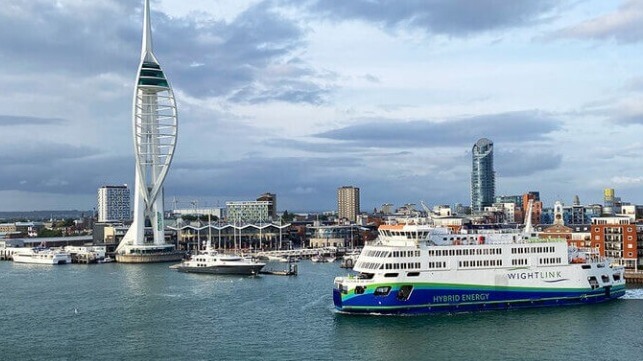UK Awards Funding for $100M in Zero-Emission Vessel Demonstration Projects

The UK Government announced the latest round of zero-emissions shipping projects that have been selected for funding under its Zero Emission Vessel and Infrastructure (ZEVI) fund. Five projects with a proposed cost of £81 million ($101 million) will receive £55 million ($69 million) in government funding to support the development and demonstration of the new technologies.
The announcement of the awards was timed to the start of the London International Shipping Week which is bringing together leaders of the shipping industry. According to UK Transport Secretary Mark Harper, the announcement of the new round of funding is timed to showcase the work underway to develop clean technologies and generate maritime jobs in the UK.
The ZEVI fund was launched in February. Under the rules of the competition, it is designed to support projects that will take tech from the factory to the sea. Successful projects needed to be able to show that they could use the money to work with UK ports and operators to launch a zero-emission vessel by 2025 at the latest.
The largest individual award, £20 million ($25 million), is going to a consortium led by Bibby Marine which will work alongside partners Kongsberg, Shell, DNV, Liverpool John Moores University, the Port of Aberdeen, and ORE Catapult, to build the first electric SOV (eSOV) in the UK. The 295-foot electric vessel will operate completely emission-free in-field and will feature a sizable battery unlike any installed on a DP vessel before, with dual-fuel methanol-powered engines as backups.
Similarly, a project to develop a zero-emission ferry service for the Orkney Islands will receive £15.5 million ($19.4 million). Organizers highlight that this is one of the harshest environments for shipping. Orkney Ferries partnering with Artemis Technologies and The European Marine Energy Centre plans to commission two Artemis 100 percent electric foiling vessels and provide the associated charging infrastructure. The three-year demonstration will see the introduction of one 12-passenger vessel, operating a year-round service in the inner island network, up to six times daily and a second 50-passenger vessel also able to carry cargo, operating a daily service up to four times between Orkney mainland and the North Isles.
Another project seeks to reduce the freight transported overroad in London. Funding of £9 million ($11.2 million) will support an effort to build a 131-foot, 100 percent electric, fast freight catamaran that operates at 22 knots for 55 minutes, carrying a payload of 20 tons. It is a three-year demonstrator project that will deliver up to 54,000 middle-mile parcels a day along a 14.6 nautical mile route on the Thames.

that matters most
Get the latest maritime news delivered to your inbox daily.
Tidal Transit will be part of a project receiving £6.3 million ($7.9 million) to convert four existing offshore wind crew transfer vessels to pure electric operations. The last designated project will receive 4 million to develop a network of 20 electric workboats of three different classes.
The ZEVI fund is part of the larger UK Shore program, launched in March 2022. It is providing £206 million ($258 million) in funding to tackle shipping emissions and advance the UK toward sustainable shipping.
